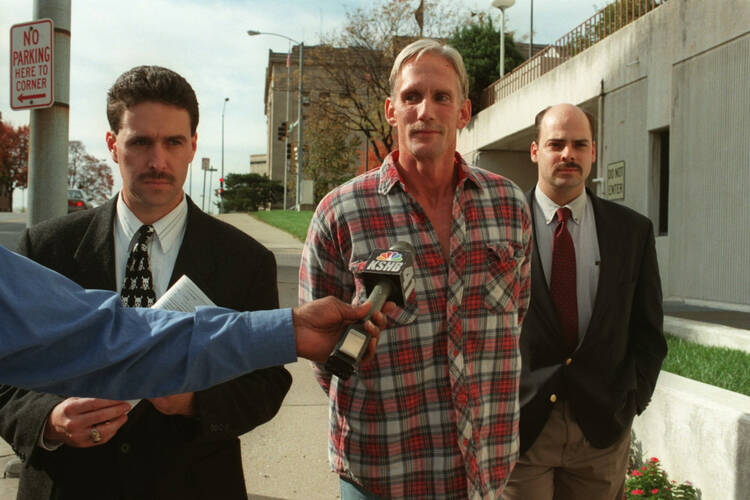TERRE HAUTE, Ind. (AP) — The United States on Thursday carried out its second federal execution in three days following a hiatus of nearly two decades, killing by lethal injection a Kansas man whose lawyers contended he had dementia and was unfit to be executed.
Wesley Ira Purkey was put to death at the Federal Correctional Complex in Terre Haute, Indiana. He was sentenced to be executed for kidnapping and killing a 16-year-old girl, Jennifer Long, before dismembering, burning and dumping her body in a septic pond. He also was convicted in a state court in Kansas of using a claw hammer to kill an 80-year-old woman who had polio.
After Purkey was strapped to a gurney inside the execution chamber, a prison official removed a mask from his face and asked if he wanted to make a final statement.
He leaned his head up slightly from the gurney and said: “I deeply regret the pain and suffering I caused to Jennifer’s family. I am deeply sorry."
He also expressed remorse for his own adult daughter's suffering from his actions. "I deeply regret the pain I caused to my daughter, who I love so very much,” he said.
His last words were: “This sanitized murder really does not serve no purpose whatsoever. Thank you.”
As the lethal chemical was injected, Purkey took several deep breaths and blinked repeatedly, laying his head back down on the gurney. His time of death was 8:19 a.m. EDT.
Jennifer’s father, William Long, and her stepmother were there. Long said delays since the 2003 trial were excruciating and he was glad it was over.
He said he hoped Purkey “rots in hell.”
“We took care of today what we needed to take care of,” Long said. “It has been a long time coming. He needed to take his last breath; he took my daughter’s last breath. And there’s some resolve. There is no closure, and there never will be because I won’t get my daughter back.”
The Supreme Court cleared the way for the execution to take place just hours before, ruling in a 5-4 decision. The four liberal justices dissented, as they had for the first case earlier this week.
Justice Sonia Sotomayor wrote that “proceeding with Purkey’s execution now, despite the grave questions and factual findings regarding his mental competency, casts a shroud of constitutional doubt over the most irrevocable of injuries.” She was joined by Ruth Bader Ginsburg, Stephen Breyer and Elena Kagan.
The Supreme Court also lifted a hold placed on other executions set for Friday and next month. Dustin Honken, a drug kingpin from Iowa convicted of killing five people in a scheme to silence former dealers, is to be put to death at the prison on Friday.
While Purkey's final words were lucid and contrite, his lawyers say his mental health had seriously deteriorated to the point he didn’t have the stamina for long visits with his legal team and often forgot key facts and dates.
Purkey's was the federal government’s second execution after a 17-year hiatus as the Trump administration pressed for a resumption. Daniel Lewis Lee was put to death Tuesday after his eleventh-hour legal bids failed. Both executions were delayed as legal wrangling continued late into the night and into the next morning.
The Justice Department has been questioned for holding the executions in the middle of the worsening coronavirus pandemic, prompting lawsuits over fears those who would travel to the prison could become infected. The decision to resume executions after nearly two decades was also criticized as a dangerously political move in an election year, forcing an issue that is not high on the list of American priorities considering the 11% unemployment rate and the pandemic.
A Justice Department spokeswoman on Thursday said a just punishment had been carried out.
“After many years of litigation following the death of his victims, in which he lived and was afforded every due process of law under our Constitution, Purkey has finally faced justice,” spokeswoman Kerri Kupec said.
Purkey’s lawyers had argued his condition had deteriorated so severely that he didn’t understand why he was being executed. They said he was repeatedly sexually assaulted as a child and had been diagnosed with schizophrenia, bipolar disorder and other mental health conditions.
The issue of Purkey’s mental health arose in the run-up to his trial and when, after the verdict, jurors had to decide whether he should be put to death in the killing of Jennifer in Kansas City, Missouri. Prosecutors said he raped and stabbed her. He was separately convicted and sentenced to life in the beating death of 80-year-old Mary Ruth Bales, of Kansas City, Kansas.
Purkey had a long history of childhood trauma, was sexually abused by family members and a Catholic priest and was beaten by other family members, said Liz Vartkessian, a mitigation specialist who worked with Purkey’s legal team and visited him dozens of times in the last five years.
“His case is replete with instances where he has expressed a deep remorse,” she said in an interview earlier this month.










